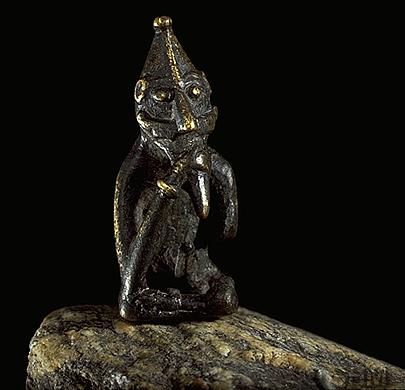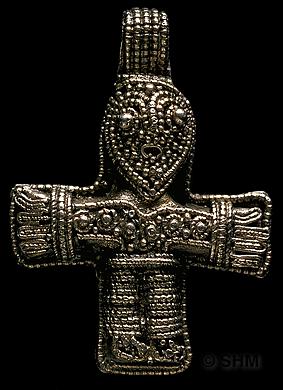

INDIANA
UNIVERSITY HIST J400
PAGANS
AND CHRISTIANS
IN THE
EARLY MIDDLE AGES
Spring, 2010
| Dr.
Deborah Deliyannis Office: Ballantine Hall 708 Office hours: Wed. 1:30-3:30 or by appointment Phone: 855-3431 Email: ddeliyan@indiana.edu |
TuTh 1-2:15
pm WH204 Sect. 11562 |
Description
Between
AD 33 and 1400, the people of Europe
gradually converted from a variety of other religions to Christianity. In this
course, we will consider the
(scanty) evidence for pre-Christian religions and the narratives of
conversion
for each region of Europe, focusing on the post-Roman period (i.e.
after AD
400). We will critically read both
primary sources and secondary literature, and we will also consider
archaeological
evidence, in order to understand what can be learned about these topics.
Books
There is one
main textbook for the
semester, which
is available for purchase at the IU Bookstore and on reserve in the
main
library:
Richard
Fletcher, The
Barbarian Conversion: From Paganism to Christianity (University
of California Press, 1999).
Other readings
are
assigned on the weekly course
schedule,
and will be accessible via the online syllabus, found via Oncourse or
directly
at:
/j400s10.htm
A full bibliography , with complete references for the readings and
additional works of interest, can be found here.
Note that
several of the
readings are copy-right protected, and you must use a password to see
them. The username and password
are on the written syllabus, and on Oncourse under Announcements.
Requirements
The
course will require weekly readings and short exercises on primary
sources,
participation in discussion sections, and a midterm and final exam.
| Attendance and participation in discussion | 20% |
| Weekly written assignments (as below) | 15% |
| Book report | 10% |
| Paper
presentation |
10% |
| Research paper | |
| Bibliography (due Feb. 16) | 5% |
| Thesis sentence (due Mar. 23) | 5% |
| Rough draft (due Apr. 1) | 5% |
| Peer review of
drafts
(due Apr. 8) |
5% |
| Paper | 25% |
Attendance
will be taken
in every class. Participation
means having done the assigned reading for the day, having formed
opinions
about it based on the set discussion question for the day, and taking
part in
discussion. Your grade for this
component will be based on your attendance percentage, modified by your
participation. Thus, if you have
100% attendance but never talk, you will earn a B-; if you have 87%
attendance
but contribute frequently and usefully to the class, you will earn an
A- or A,
and so on.
For each class
there will
be an assigned discussion question based on the readings; in some cases
these
will be related to your research paper.
You are to write a short one-page (double-spaced, 1" margins,
12-point font) response to the question.
These will be graded with check/check-minus/F.
You may miss up to 4 of them; I suggest that you save these
in case you are sick or have some other emergency.
Your grade for this component of the class will be based on
your turning in the correct number of papers, and performing
satisfactorily on a
majority of them.
Each student
will present
one book report on a scholarly book.
The books are listed by date on the syllabus, and there is a
list at the
end of the syllabus. Your book
report should take no more than 10 minutes (practice!
and be concise).
In it you should briefly explain (a) what the subject and thesis
of the
book are; (b) what primary sources the author uses in the book; and (c)
whether
you found it informative and convincing. THERE IS NO WRITTEN
COMPONENT TO THIS ASSIGNMENT.
Your research
paper should
be 15-20 pages (12-point font, double spaced, 1" margins), and will be
on a
topic of your choice. A list of
suggested topics can be found at the end of the syllabus, and it is
strongly
suggested that you choose one of them; if you wish to write on
something else,
you must discuss it with me.
Paper topics
must be
officially declared in writing on Feb. 2 (just a brief one-sentence
statement
about what you are going to research).
A preliminary bibliography is due in writing, in class on Feb.
16. A preliminary thesis sentence (which
presumes that you have already read many of the items on your
bibliography) is
due in writing, in class on Mar. 23.
A rough draft
of your
paper, of at least 8 pages, is due in electronic and in hard copy on
April
1. You will be assigned the drafts
of two other students in the class, to critique. Your
written, 1-page, critiques of these two drafts will be
due in class on April 8.
During the
last two weeks
of class, each student will give a short (10-12 minute) presentation of
the
material that will be covered in your paper. The
dates will be assigned on Feb. 4, based on the topics of
the papers. It is strongly
suggested that your paper be finished by the date of your presentation. Your
presentation will be graded on how
clearly you explain the topic of your paper, whether you use
appropriate visual
aids (diagrams, transparencies, etc.), whether you stick to the time
limit, and
how well you answer questions.
Research
aids
The
International Medieval
Bibliography (IMB Online) is an essential resource for research on
medieval
topics (but does not include books).
It can be accessed online through the IU Libraries webpage at:
http://www.libraries.iub.edu/index.php?pageId=1044&mode=alpha&letter=I
Another
excellent online
bibliography (that includes books), the Regesta Imperii, is maintained
by the
University of Mainz:
http://opac.regesta-imperii.de/lang_en/index.php
The History
Department has
set up an extremely useful webpage about writing research papers for
J400
classes; it can be found at:
http://www.indiana.edu/~histweb/seminars/index.html
Finally, a
group of
scholars headed by Nora Berend have set up a website on
"Christianization
and the Rise of Christian Monarchy", to go along with their book of the
same title. It contains a lot of
information on the regions of Central, Eastern, and Northern Europe,
and can be
found at:
http://christianization.hist.cam.ac.uk/
* * * * * * * *
* * * * * * * * * * * *
* * * * *
Suggested Term paper topics
A good term
paper should
use primary sources, plus any and all secondary sources that have been
written
about the topic. While reading the
secondary sources, you may well find references to more primary sources. Some of
these may not be translated
into English; if you have questions, ask!
Your paper
should offer a
detailed account of a particular issue, framed around a question and a
thesis. Do not simply write on
"St. Boniface," for example, but find a question about St. Boniface
to which you would like to know the answer.
You may frame
your
question around a single individual, object, or text; or you may
instead ask a
more general question. Some
examples of the former are:
The burials
under Cologne
Cathedral (Franks)
The Franks
Casket
(Anglo-Saxon England)
The Sutton Hoo
Mound 1
burial (Anglo-Saxon England)
The Gosforth
Cross
(England/Vikings)
St. Bridgit
(Ireland)
St.
Patrick/Palladius
(Ireland)
The
"Zbruch/Zbrucz
Idol" (Russia)
The Khazar
conversion to
Judaism
Svarog (Slavic
god)
The Crown of
St. Stephen
(Hungary)
St. Adalbert
of Prague
(Hungary, Poland)
Adam of
Bremen's
descriptions of pagans
Here are some
more general
topics (but you need to make sure that you can use primary sources):
The transition
from adult
to infant baptism
The conversion
of slaves
Women and
conversion (pick
some particular aspect)
Marriage
between
Christians and non-Christians
Religious
justifications
for violence against pagans/apostates
Eastern vs.
Western
Christianity (pick one region:
Slavs, Bulgaria, Livonia)
Missionaries
to the
Muslims
Pagan attacks
as
"God's punishment" [Vikings, Magyars]
Pagan
reactions to conversion
(choose Bulgaria, Hungary, Poland, or compare)
Conversion of
Jews to
Christianity
Conversion of
Christians
to Islam
Magic and
Christianity/paganism
Or, you can
pick something
else that interests you, or ask me to help you figure something out.